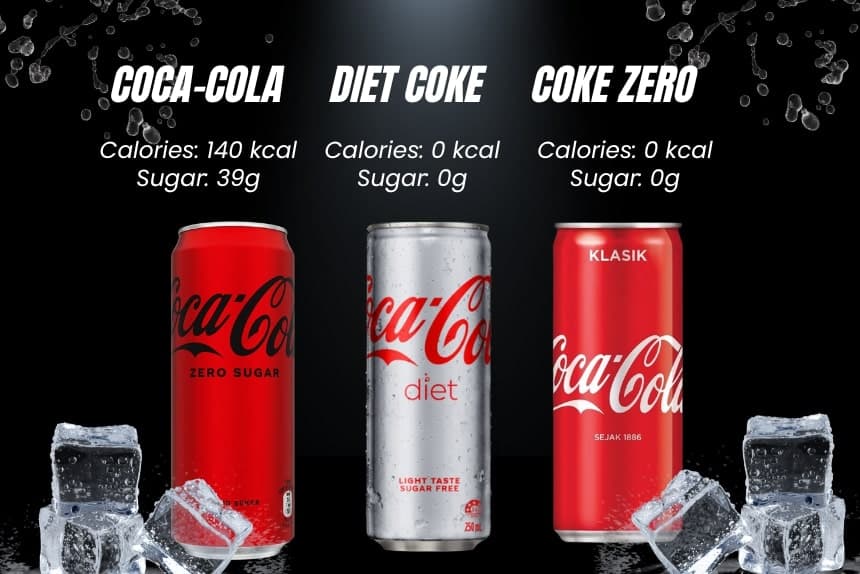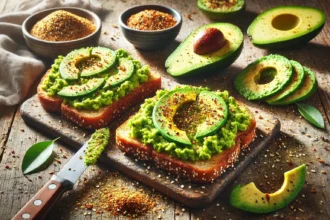The soda aisle is filled with options, and choosing between Coke Zero vs. Diet Coke can be confusing. Both are zero-calorie, sugar-free alternatives to regular Coca-Cola, but they differ in ingredients, taste, and nutritional impact. Whether you’re cutting back on sugar or just curious about the differences, this guide will help you decide which one best fits your lifestyle.
Coke Zero: What’s Inside the Can?
Coke Zero is formulated to taste more like regular Coca-Cola, without the sugar and calories. Here’s a look at its key ingredients:
✔ Carbonated Water – Provides the signature fizz.
✔ Caramel Color – Creates the classic dark brown color.
✔ Aspartame & Acesulfame Potassium – Artificial sweeteners that add sweetness without calories.
✔ Phosphoric Acid – Contributes a tangy flavor.
✔ Natural Flavors – A proprietary blend for that cola taste.
✔ Potassium Citrate – Regulates acidity.
✔ Caffeine – Provides a mild energy boost (34 mg per 12 oz can).
💡 Nutritional Profile (per 12 oz can)
Calories: 0 | Sugar: 0g | Sodium: 40mg | Caffeine: 34mg

Diet Coke: What Makes It Different?
Diet Coke has been around since the 1980s and has a distinct taste profile, separate from the original Coca-Cola. Here’s what’s inside:
✔ Carbonated Water & Caramel Color
✔ Aspartame – The sole sweetener, giving it a lighter taste.
✔ Phosphoric Acid & Citric Acid – Enhance tartness.
✔ Potassium Benzoate – Preserves freshness.
✔ Caffeine – Higher than Coke Zero (46 mg per 12 oz can).
💡 Nutritional Profile (per 12 oz can)
Calories: 0 | Sugar: 0g | Sodium: 40mg | Caffeine: 46mg
📌 Key Difference: While Coke Zero aims to replicate original Coca-Cola’s taste, Diet Coke has a sharper, lighter profile.
Coke vs Diet Coke vs Coke Zero: Nutritional Profile
While taste is subjective, the nutritional differences between coke zero vs diet coke are clear and significant. Below is a comparison table highlighting the key nutritional values for a standard 12-ounce (355 ml) serving:
| Nutrient | Coke Zero (per 12oz) | Diet Coke (per 12oz) | Coca-Cola Classic (per 12oz) |
| Calories | 0 | 0 | 140 |
| Sugar | 0g | 0g | 39g |
| Sodium | 40mg | 40mg | 45mg |
| Carbohydrates | 0g | 0g | 39g |
| Protein | 0g | 0g | 0g |
| Fat | 0g | 0g | 0g |
| Potassium | 60mg | 35mg | 0mg |
(Source: Coca-Cola Product Facts. Values may vary slightly depending on the specific product and region.)
Is Diet Coke Really 0 Calories?
Diet Coke isn’t truly zero-calorie; it has trace calories (around 0.9% of an M&M), due to aspartame’s structure.
Key Differences
The most notable nutritional contrast among these options lies in their sugar and calorie content. Coca-Cola Classic delivers a significant amount of sugar, which results in a higher calorie count. In contrast, both are sugar-free and virtually calorie-free, making them appealing choices for those who wish to reduce their sugar or calorie intake.

Taste & Sweeteners: What’s the Difference?
When it comes to flavor Coke Zero vs Diet Coke each offer a unique taste experience. Many people agree that Zero comes closest to mimicking the classic cola flavor, providing a familiar sweetness without the extra calories. In contrast, Diet Cola has a noticeably different profile—some find it lighter, while others note a more artificial taste.
✔ Coke Zero: Uses Aspartame + Acesulfame Potassium, making it taste closer to original Coca-Cola.
✔ Diet Coke: Uses only Aspartame, giving it a sharper, lighter flavor.
✔ Regular Coke: Sweetened with high fructose corn syrup, creating the classic sugary taste.
Which one tastes better?
👉 If you want a closer match to regular Coke, go for Coke Zero.
👉 If you prefer a lighter, more unique taste, Diet Coke is the better option.

Health Implications: Is Coke Zero and Diet Coke Bad for You?
While both coke zero vs diet coke are promoted as healthier alternatives to sugary sodas, their long-term health effects remain a topic of ongoing research and debate. Here’s what we currently understand:
Potential Risks & Side Effects
🚨 Artificial Sweeteners (Aspartame & Acesulfame K)
✔ FDA-approved, but studies on long-term effects continue.
✔ May impact gut bacteria and appetite regulation.
🚨 Phosphoric & Citric Acid
✔ Can contribute to dental erosion over time.
✔ Phosphoric acid has been linked to reduced bone density in high consumption.
🚨 Caffeine Content
✔ Coke Zero: 34 mg per 12 oz
✔ Diet Coke: 46 mg per 12 oz
✔ May cause jitters or sleep disturbances in sensitive individuals.
Which One Is Healthier?
While diet sodas may seem like a better alternative to sugary soft drinks, they still offer little to no nutritional value. For optimal hydration and overall well-being, plain water remains the best choice.
✔ Both are better than regular Coke in terms of sugar and calories.
✔ Neither is a healthy choice for daily hydration.
Healthier alternatives
There’s no such thing as a truly “healthy” soda, as even diet versions contain artificial ingredients. However, if you’re looking for a fizzy and flavorful drink without added sugars or artificial sweeteners, consider these options:
✅ Sparkling water (zero sugar, no additives).
✅ Unsweetened iced tea (antioxidants, metabolism boost).
✅ Homemade fruit-infused water (natural flavor + hydration).
💡 Moderation is key! Drinking Coke Zero or Diet Coke occasionally is unlikely to cause harm, but for daily hydration, water is always the best option.
💡 Pro Tip: If you’re craving a soda-like experience without artificial ingredients, kombucha (a fermented tea) can be another option. It offers probiotics, which may support gut health.
By making small swaps, you can reduce your intake of artificial additives while still enjoying a refreshing and satisfying beverage. When in doubt, water is always the best choice for long-term health.
Frequently Asked Questions (FAQs)
Is Diet Coke Unhealthy?
The term “unhealthy” can be broad. Diet Cola doesn’t offer any nutritional value beyond its refreshing taste. While it’s a better option than regular soda in terms of sugar and calorie content, the long-term effects of aspartame are still being studied. Moderation is key.
How Unhealthy Is Coke Zero?
Like Diet Coke, Zero is free of calories and sugar. However, its reliance on artificial sweeteners and other additives means it also doesn’t provide significant nutritional benefits. The potential long-term impacts of these ingredients continue to be researched, so it’s wise to enjoy it in moderation.
Can I Drink Coke Zero Every Day?
An occasional Zero is unlikely to cause harm, but daily consumption may not be the best choice. The long-term effects of its artificial sweeteners and other components are still under review. For regular hydration, water, unsweetened tea or sparkling water are healthier alternatives.
Is Coke Zero or Diet Coke Better for You?
From a nutritional perspective, there’s no significant difference between the two—they’re both calorie-free and sugar-free. The decision between Coke Zero vs Diet Coke often comes down to personal taste preference, as neither beverage offers meaningful nutritional benefits.
Is Coke Zero OK for Weight Loss?
While it eliminates sugar, artificial sweeteners may impact appetite and cravings. It’s not a guaranteed weight-loss solution.
Does Coke Zero affect blood sugar?
It won’t spike blood sugar, but studies on artificial sweeteners and metabolic health are ongoing. People with diabetes should consult their doctor.
Is Diet Coke banned in Europe?
No, but it’s marketed as Coca-Cola Light in some regions.
Is there a truly healthy soda?
Not really. The best alternatives are sparkling water, unsweetened teas, or infused water.






